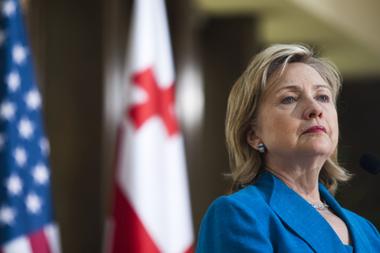
Clinton in Georgia: Precious Few Deliverables
Publication: Eurasia Daily Monitor Volume: 7 Issue: 129
By:

US Secretary of State, Hillary Clinton, paid a six-hour visit to Georgia on July 5, as part of a tour of five countries in five days. Her Georgia visit was the first by a top US official since Vice-President, Joseph Biden, visited exactly one year ago. A box-checking exercise perhaps from a Washington perspective, Clinton’s visit was nevertheless awaited with trepidation in Georgia for its potential results. In the event, it brought precious few deliverables. Yet, it acknowledged explicitly, as well as implicitly, the internal political consolidation of Georgia and effective performance of President Mikheil Saakashvili’s government.
The visit’s major result is a symbolic one: the US government has introduced the official wording “invasion” and “occupation” to describe Russia’s August 2008 war against Georgia and seizure of Abkhazia and South Ossetia.
This wording contrasts with the prevailing Brussels assessment of Russia’s war as a mere “disproportionate response.” Georgian diplomacy labored for almost two years to change the official wording of the US assessment. Some European countries might follow suit, seeing that the US decision is not incompatible with the “reset” policy toward Russia. The Lithuanian parliament was first to adopt this wording (BNS, June 1).
If adopted by more governments, the “invasion” and “occupation” assessment should at a minimum discourage fence-sitter countries from recognizing Russian-occupied Abkhazia and South Ossetia as “states.” The new US terminology implies not only illegitimacy of the 2008 outcome but also its provisionary nature. If reflected in international documents it can support Georgian diplomacy’s goal of “de-occupation” of Abkhazia and South Ossetia. The Kremlin will undoubtedly veto the use of such terms in those organizations in which it holds veto power. Georgian diplomacy and that of supportive countries, however, has now received a strong argument for raising this issue high on the international agenda.
A White House document, “US-Russia Relations: ‘Reset’ Fact Sheet,” released on June 24, put the change of terminology on the official record. It defined the US position as urging Russia to end the “occupation” and withdraw the troops from Abkhazia and South Ossetia, the “occupied regions of Georgia” (Giorgi Kvelashvili, “Georgia’s Anti-Occupation Strategy Gains More International Support”, www.jamestown.org/blog, June 29).
Released during Russian President, Dmitry Medvedev’s, US visit, the White House document aimed in part to dispel the view that Washington’s was sacrificing the interests of Russia’s neighbors while “resetting” relations with Russia. Defending the same thesis in his June 29 preview of Clinton’s visit (State Department transcript, June 30), however, US Assistant Secretary of State, Phillip Gordon, apparently refrained from using the term “occupation.” For her part, Clinton made repeated use of the terms “occupation” and “invasion” while in Tbilisi (State Department transcripts, July 5).
Beyond symbolism and semantics, however, the change does not seem to reflect any pro-active US policy to reverse Russia’s conquests. As US National Security Council Director, Michael McFaul, has ruefully admitted on several public occasions in recent weeks, Washington has no strategy in this regard (Foreign Policy, June 21). In Tbilisi, Clinton declared “steadfast” support for Georgia’s territorial integrity while urging Russia to respect the 2008 ceasefire agreement, withdraw the troops to pre-war lines, and allow humanitarian access to Abkhazia and South Ossetia. Such rhetoric makes no difference on the ground, however.
Clinton prescribes democratic and economic development for Georgia to make itself more attractive to the Abkhaz and Ossetians, and thus to restore Georgia’s territorial integrity. In the conclusion of her town-hall-type meeting in Tbilisi she admitted that this is a goal “for the children and grandchildren” (State Department transcript, July 5). This prescription is not new. The United States and the European Union had urged it on Georgia since the 1990’s, as a substitute for a Western-led solution when this was still possible. At present, however, the options that existed before 2008 seem to have been foreclosed for the foreseeable future.
Clinton reaffirmed a familiar US position ruling out Russian claims to a sphere of influence, in Georgia or elsewhere. She assured Georgia that the United States “can walk and chew gum at the same time” in pursuing the reset with Russia and the partnership with Georgia, there being no zero-sum game involved. In response, Kremlin propagandist, Konstantin Semin, wondered aloud as to how Washington would share out the chewing gum between Moscow and Tbilisi in a zero-sum game situation (Russian Television Channel One, July 5).
The US-Georgia Strategic Partnership Charter, signed during the Bush administration’s final days in January 2009, has yet to be implemented and show results. Clinton only mentioned it publicly after Saakashvili had mentioned it twice during the concluding press conference (State Department transcript, July 5).
US support for Georgia to join NATO remains consistent at the level of principle (Georgia like any country has the right to make this decision independently) and the level of process (Georgia must meet the criteria) (Rustavi-2 TV, July 5). Meanwhile, however, the United States essentially withholds military assistance from Georgia, and Clinton’s visit did not signal any change in this regard.




